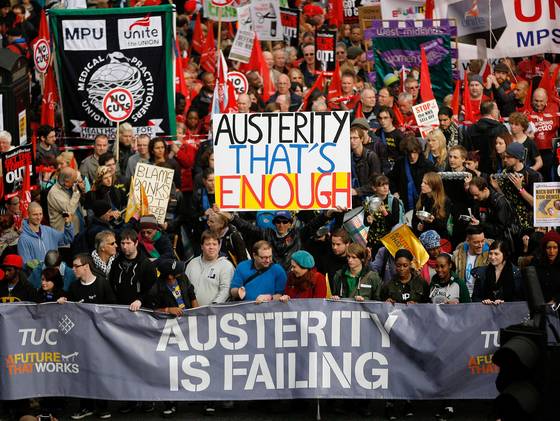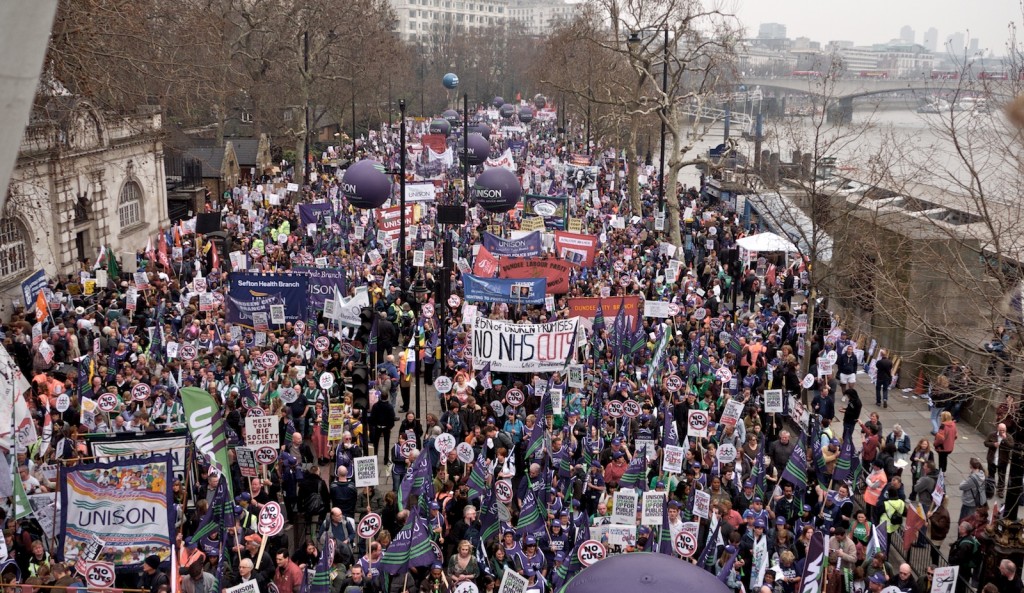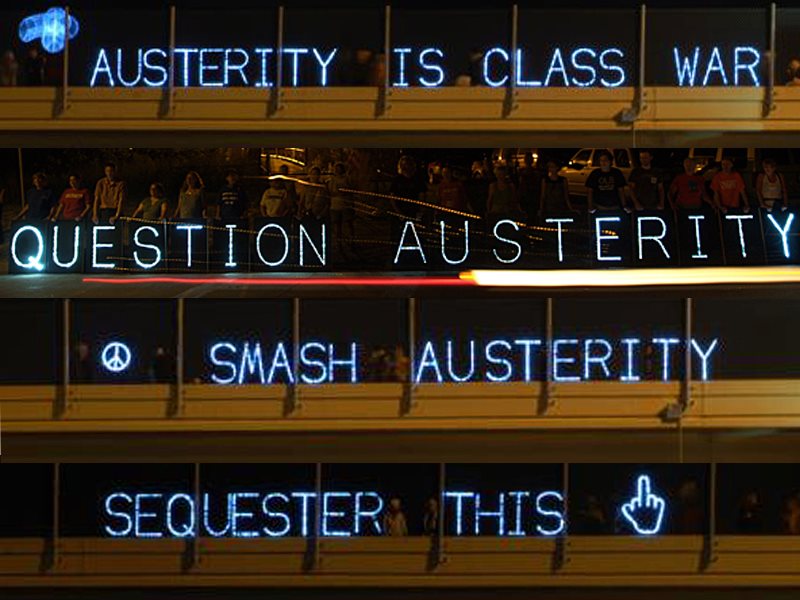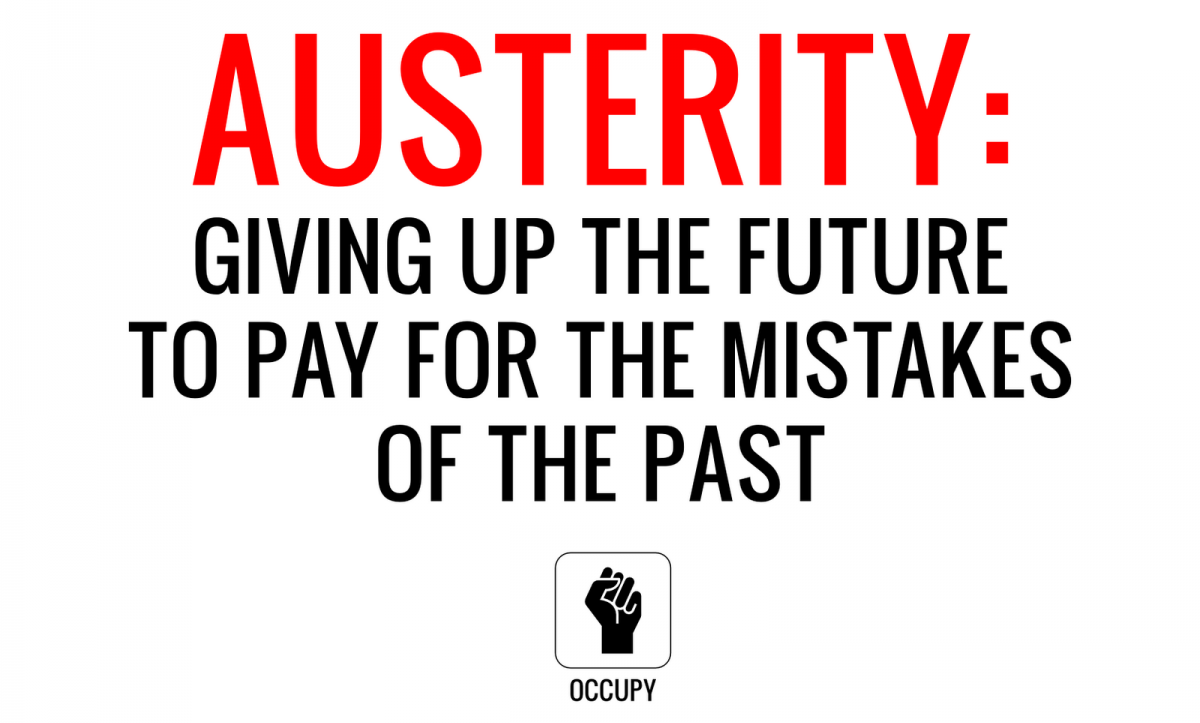
Unconventional oil and austerity policies are accelerating the planetary crises. Bank bailouts, tar sands and fracking appear distinctive, yet the forces driving them forward share the same rationale, mindset and tactics. Understanding the common ground between them could further galvanize those who are resisting — and who have yet to visibly resist — these disastrous undertakings.
Let's be clear: our fossil fuel dependency is at a critical juncture. Energy scarcity has dragged tar sands and fracking onto the global map. The use of these and other unconventional fuels will only intensify an industry that already threatens the global ecosystem. At the same time, the financial industry is in crisis. To make profits, regardless of the consequences, bankers are working as active agents to injustice. Austerity has been heralded as the answer to economic imbalances, although after widespread examination, both unconventional oils and austerity are known to be worsening already dire situations. Banks and big oil, working together, bear a large share of responsibility for this dual crisis.
Global economic inequality, according to Save the Children, has now reached a 20-year high. Representative democracy has been eroded by powerful lobbying interests, the revolving door and corporate media. Recent probes show how BP and Shell have been actively fixingthe price of oil. Add to this a long list of monopoly cartel and speculation activity, including the LIBOR rate rigging scandal and widespread speculation on basic food commodities.Numerous other violations get committed in the interests of conventional oil, banks and corporations. One instance is highlighted by a recent Global Witness film, "BankWatch," which features British wildlife presenter Bill Oddie observing HSBC's support of rainforest deforestation and human rights abuses in Malaysia.
Unconventional oil and austerity are legitimized by false promises, and austerity’s rationale has recently been dealt an embarrassing blow. Economists Kenneth Rogoff and Carmen Reinhart devised a key justification for reducing debt, but it was based on miscalculations. The fallout from debt reduction strategies is shown particularly in Greece, where it is causing a political and societal meltdown.
Published this year, politics professor Mark Blyth’s "Austerity: The History of a Dangerous Idea" traces how there is no empirical evidence that austerity has ever worked without extenuating circumstances. Blyth points out how European ministers in 2010 were encouraged towards following austerity policies by Italian economist Alberto Alesina, who focused on examples such as Ireland's economic growth through austerity measures in the late 80s. Blyth explains that Alesina has failed to take into account that during this period the main Irish export market was Britain, which was in a massive boom.
Now, to push fracking, the British Government foretells a positive outlook despite the industry’s own dire track record. In the U.K., fracking is generally reported to be a safe, clean energy source that could fuel Britain well into the century. The process of injecting poisonous chemicals, mixed with enormous amounts of water, into the ground at high pressure has led to safety concerns in France, Bulgaria and Holland, causing all three countries to ban it.
In the U.K., the Advertising Standards Authority has asserted that Cuadrilla – the only U.K. fracking company – cannot claim to use “proven, safe technologies.” Fracking has also been criticized by the U.K.’s Geological Survey for causing earthquakes; there has also been the first confirmed leak in Scotland.
The projected amount of gas to be gained from fracking in the U.K. is contentious. A Parliamentary Committee has contradicted the government, suggesting they massively over-estimated the potential reserves. Likewise estimates of Poland’s shale gas reserves have been cut by 80%, causing an exodus of gas giants such as ExxonMobil.
The proposed Keystone XL tar sands pipeline is also based on false promises. Its lobbyists talk of the thousands of jobs and energy security it will create for the US. Yet the State Department reports it will only create 35 permanent jobs. As for energy independence, Tar Sands Action quotes investor reports showing how much of the oil pumped from tar sands is aimed for export markets. Conversely, oil spills across aquifers – which are already at risk from fracking – severely threaten America’s fresh water security.
Unconventional oil and austerity represent, at the core, an attack on democracy. Tar sands exploitation breaks indigenous treaty rights to live from the land. Likewise, there was no mandate or referendums about the decision to bail out the bankers in the U.K. Even worse, in the Southern European countries the decision was imposed from outside their countries.
The indigenous movement Idle No More rose up swiftly to stand against big oil and nuclear waste dumping on their lands. I asked Sylvia McAdam, one of the movement's co-founders, what she thought these unconventional oils said about where humanity was headed. “The way we are extracting resources is a major issue, it's devastating the land and water. Indigenous Elders and scientists are saying the same thing: ‘our earth cannot sustain these horrendous activities’. We have no choice but to keep pressuring all of our leadership to begin moving towards renewable and sustainable energy.”
In the G8 summit in Northern Ireland, London will be a focus for actions against the dual global crises. One of the actions, They Owe Us, aims to simultaneously challenge austerity and big oil, which “keep the wheels of capitalism turning.” It will target Canary Wharf as “an icon of profits for the few and disaster for the many.” Now seems to be an ideal juncture for those questioning the economic direction we are headed — and to combine the questioning with ways of advocating, and producing, a more ecologically sustainable future.
3 WAYS TO SHOW YOUR SUPPORT
- Log in to post comments




















